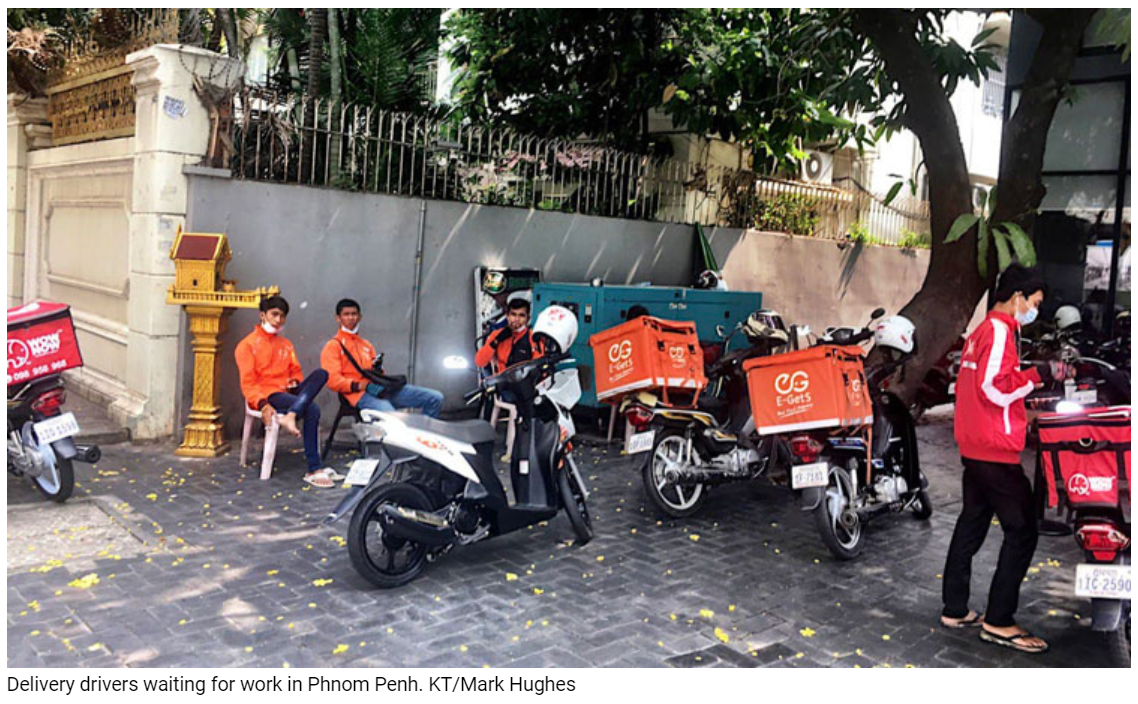Cambodia: Restaurants on the edge as ban on dining in persists
While food delivery companies have cashed in on strictly enforced delivery or takeaway only protocols for restaurants during lockdown, many dining outlets are hanging on by a thread.
Last month, Megan Coull, the owner of casual-dining restaurant Penh 278, had no choice but to reduce staff shifts and wages.
The restaurant has been slightly buoyed by delivery services, but she said it hasn’t been enough to offset the losses.
“It’s really at a critical point now. If we are forced to continue operating with delivery and takeaway only, we will have to consider taking a break over the next month, or coming up with a more economically feasible plan B, because it’s been a lot of personal investment going into the business these past months,” Coull said.
Keeping a dine-in restaurant open without physical customers allowed has been taxing, she added.
“Not only has business dropped dramatically, but the uncertainty is draining, having to wait for announcements constantly and being given information that is either limited or conflicting a lot of the time.”
On April 11, restaurants were forced to offer take-out or delivery service only, which was followed by a lockdown and a complete alcohol ban in the city.
Prior to the lockdown, dine-in service was allowed, but health guidelines followed by a government-mandated curfew had already started to dig at profits.
While the measures were considered to be necessary to curb the spread of COVID-19, establishments that only serve alcohol were left without income and restaurants had to be completely reliant on delivery app takeaway services.
Singaporean Hoonie Lin, the co-owner of Margarita Cocktail bar in Tuol Tompoung, told Khmer Times: “We had a menu ready and were serving finger food. We were even planning on opening a cocktail school before having to close. Since the alcohol ban, we now have no source of income, but still need to pay rent.”
Relief measures appear to be varied. Coull said she has received a reduced rent reduction and tax burdens have been temporarily relaxed. Others report stricter measures with inflexible landlords, despite government pleas to offer relief.
For Alchemy Gastro Pub, a popular restaurant and bar with an outdoor stage in TTP, the relief wasn’t enough.
Thomas Shih, the owner of Alchemy, said he received a one-time $150 discount from his landlord as compensation.
After losing money on inventory, staff costs, electricity and rent fees, it became too much to overcome, forcing him to shut down the beloved bar and venue known for its live music on weekends.
The rise of delivery apps have been on the whole a valuable lifeline for restaurants, but not without controversy.
Food Panda and Nham 24 might be the most well-known, but there are a staggering eight such services operating now in Phnom Penh and each requires different specifications and charges different commission fees.
Options to the traditional delivery apps have popped up, such as SevaFast, which was founded by Dharma Gohil. Instead of percentage-based commission fees, he charges a fee of about $60 per month for restaurants to use his service, which does not allow cash payments.

Despite the dizzying selection of different services, most restaurant owners have appreciated the delivery companies.
Coull said: “I’m grateful to work with our delivery partners. Without their services we wouldn’t have any business at all currently. It is a little disheartening to know you’re down at least 20 percent on daily income, because that’s the average commission fee going to the delivery companies. And when you factor the cost of packaging on top of delivery commission it makes the profit margin a lot lower than it would be usually.”
She added she has noticed customer service taking a hit with the recent surge of deliveries and that there have been some issues, such as drivers asking customers for money after they’ve already paid through an app.
Ahmed Reyes, the owner of Cafe Wine O’clock, which has branches in Siem Reap and Phnom Penh, told Khmer Times: “There are just too many delivery apps now. It is simply too much work for too little return to be on all of them. The big ones have certainly helped keep us afloat during lockdown, but when you factor in the commission it is certainly not the same margins as having people in the restaurant.”
Despite commission fees and customer service issues from some of the delivery companies, respect for the delivery drivers is universal in the restaurant industry. They’ve had to navigate blockades, pass police checkpoints and rush around the city during a pandemic all the name of delivering a meal.
Deka Nine, co-owner of Carolina BBQ in Tuol Tompoung, said: “We try to treat the drivers kindly and offer them cold water if they like. Hopefully, the customers treat them nicely as well because they do risk their lives with COVID.”
Nine said before the pandemic about 75 percent of Carolina BBQ’s orders were dine-in, which shifted to a 50 percent split as COVID-19 entered the country last year.
After February, she estimated it became closer to 10 percent dine-in and 90 percent delivery before government measures forced the restaurant to provide delivery services only.
About a month ago, she said volumes of orders took a huge hit. Combined with commission fees, using eco-friendly boxes and offering promotions, the restaurant is not making a profit, she said.
The timelines for each restaurant’s survival threshold varies based on overhead costs and how suitable each eatery is for delivery orders, but for those who rely on sit-down customers, the walls are closing in.
“I can’t say how much longer we could do this but we will try our hardest to stay open as long as we can,” she said.
It’s a sentiment shared by many in the industry, who are clinging to cautious optimism while bracing for an extended moratorium on dining in.
Source: https://www.khmertimeskh.com/50857772/restaurants-on-the-edge-as-ban-on-dining-in-persists/


 Thailand
Thailand




